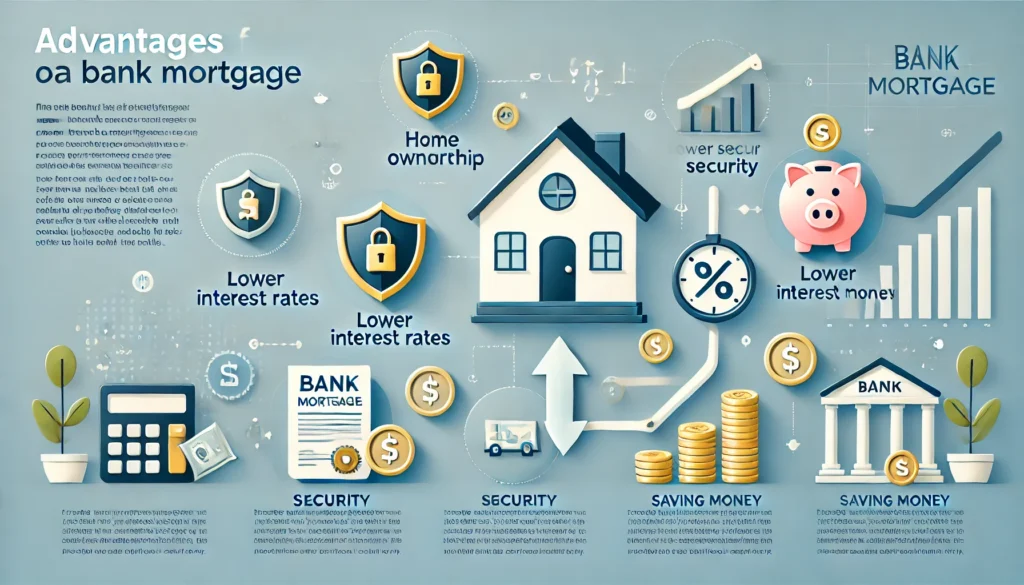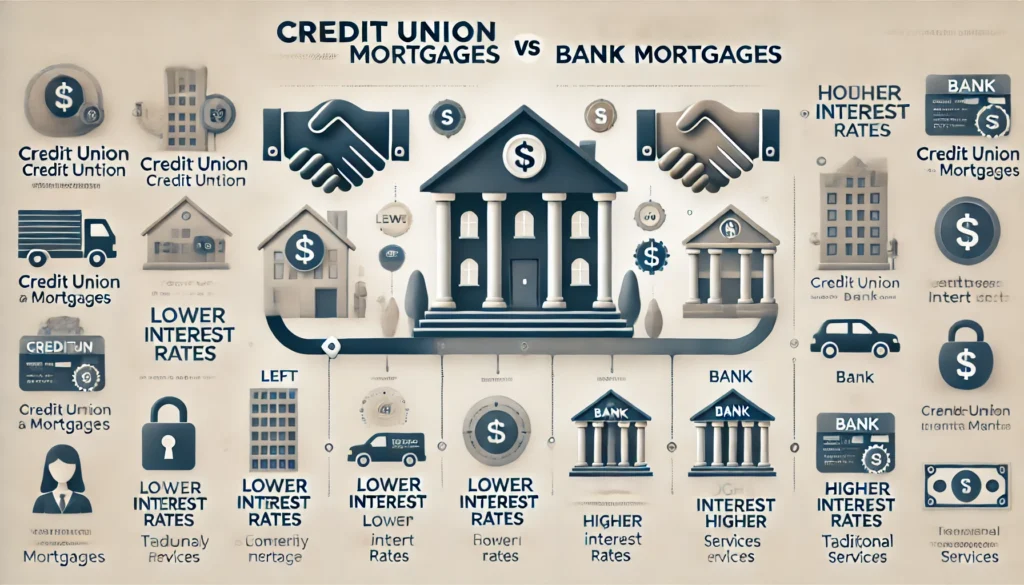Introduction
With regards to securing a loan, figuring out between a credit union or a bank can notably impact the value of your mortgage, the first-class customer support you get hold of, and the long-term management of your loan. While each variety of lender offers competitive mortgage products, their variations in structure, provider, and financial offerings can form your experience as a borrower. This manual will discover the key similarities and variations among credit union and financial institution mortgages, helping you choose the best lender based totally on your financial needs and possibilities.
Table of Contents
Similarities Between Credit Union and Bank Mortgages
Even though credit unions and banks perform brilliantly, they provide similar loan products. Whether or not or now not you’re seeking out a set-rate mortgage, an adjustable-charge loan (ARM), or a jumbo mortgage, both styles of establishments provide alternatives to fulfill your property financing wishes. Here is an outline of their similarities:
Loan Types
Each credit unions and banks provide diverse mortgage types, which include:
Fixed-Rate Mortgages
These loans provide predictable monthly payments during the loan period, ideal for borrowers who pick balance.
Adjustable-Rate Mortgages (ARMs)
With arms, the hobby charges modifications through the years primarily based on marketplace conditions, which can result in decreased preliminary payments; however, capability fee fluctuations in a while.
Jumbo Loans
Those loans exceed conforming limits set through authorities organizations like Fannie Mae or Freddie Mac and are appropriate for customers looking at excessive-quit houses.
Application Process
The utility manner in all fairness is steady across each creditor. You’ll need to provide well-known documentation together with evidence of earnings, tax returns, employment verification, and your credit score document. Each credit union and bank will decide your monetary profile to determine if you qualify for the mortgage.
Additional Financial Services
Each credit rating union and bank offers a full kind of monetary offering, which includes checking and monetary financial savings payments, credit score gambling cards, and personal loans. For borrowers who prefer to control their budget in a single area, this may be a top-notch gain. Many homebuyers pick to open payments with equal organization wherein they benefit their loan for less tough management and seamless bills.
Key Differences Between Credit Unions and Banks
Whilst each establishment provides mortgages, their essential differences in shape and operation can result in incredibly specific reports for debtors. Here is a breakdown of the important variations:

Profit Motive vs. Member Ownership
Banks
Banks are earnings-driven establishments that purpose to generate returns for their shareholders. This often results in better interest rates, fees, and stricter lending standards.
Credit Unions
Credit unions are non-profit agencies owned by way of their contributors. This lets them provide more favorable terms, consisting of decreased hobby prices and fewer prices. Considering credit unions prioritize serving their participants in place of generating earnings for external shareholders, they can frequently provide greater aggressive prices.
Membership Eligibility
Credit Unions
Credit unions commonly have membership requirements. To apply for a loan with a credit score union, you should first turn out to be a member, which may also rely on elements like geographic place, employment with a selected company, or affiliation with a certain community or employer. While membership is typically easy to achieve, it’s worth noting if you’re seeking a lender with fewer access barriers.
Banks
Banks are open to the public, meaning all of us can apply for a mortgage, no matter the area or employment. If you choose flexibility and don’t want to worry about approximately joining a group, a financial institution is probably the more convenient option.
Loan Servicing
Credit Unions
Credit unions are much more likely to keep the servicing of your loan, which means they control the whole thing from price processing to customer support. This will create a more personalized enjoyment, as you’re frequently coping with the identical group throughout the life of your mortgage.
Banks
Banks can also sell your loan to 0.33-birthday party investors after originating the loan. This indicates your mortgage can be serviced by a different organization, which can result in less personalized enjoyment and the ability to talk about troubles down the street.
Customer Service and Personalization
Credit Unions
Credit unions regularly offer extra customized providers. As smaller, community-focused institutions, they tend to build stronger relationships with their individuals. Many debtors document feeling more like a member than a client, which could make for a more comfortable and supportive mortgage technique.
Banks
Massive national banks, alternatively, might not provide the same stage of customized service. While they provide superior online equipment and cellular apps, interactions with large institutions become more transactional, and you may no longer get the individualized attention you’ll get from a credit score union.
Advantages of a Credit Union Mortgage
If you’re leaning toward a credit union mortgage, here are some of the benefits that may appeal to you:
Lower Rates and Fees
Credit score unions generally provide lower quotes and fees on mortgages, saving you money over the life of your mortgage, especially with lengthy-term mortgages like a 30-12 month loan.
More Lenient Lending Criteria
Credit unions can be extra bendy in their lending requirements, making them a terrific choice for debtors with lots of less-than-excellent credit. They’re regularly extra willing to work with first-time homebuyers or those with precise economic conditions.
Personalized Service
Credit score unions regularly offer extra-tailored customer service. You’re probably to work with the equal loan officer at some point of the technique, fostering an extra private relationship and making sure higher purchaser care.
Community Focus
Many credit unions are deeply rooted in their neighborhood communities and provide specialized packages for first-time homebuyers, veterans, or low-income debtors, regularly with low down payment options.
Advantages of a Bank Mortgage
On the other hand, here are some benefits of a bank mortgage:
Wider Range of Mortgage Products
Banks generally tend to offer a broader selection of loan merchandise, consisting of alternatives for precise monetary wishes (including subprime mortgages) or loans geared toward high-earning earners or humans in unique industries.

Convenience
With enormous department networks and advanced online platforms, banks offer greater accessibility for handling your mortgage. You could easily make bills, music your loan, and get entry to your account through cell apps or online banking. For tech-savvy borrowers, those conveniences can be a massive plus.
No Membership Requirements
Banks are open to most people, so you shouldn’t worry about approximately meeting club necessities, making the application procedure extra sincere.
How to Choose the Right Lender for Your Mortgage
While identifying between a credit union and a bank for your loan, keep in mind the following:
Financial Priorities
Are you looking for lower rates and fees, or do you prioritize a wider range of loan options and convenience?
Customer Service
Do you value personalized service, or are you more interested in the ease of managing everything digitally through a bank?
Long-Term Relationship
Would you prefer to construct an extended-term relationship with your lender, or is the benefit of a financial institution’s branch network and technology greater crucial to you?
Loan Flexibility
Do you need specialized programs, such as first-time homebuyer incentives or low down payment options, which credit unions may be more likely to offer?
Conclusion
Each credit union and financial institution’s mortgages have their pros and cons. The excellent preference for you may depend on your financial desires, alternatives, and occasions. Credit unions regularly offer lower quotes, extra personalized carriers, and stronger community recognition, even as banks excel in convenience, generation, and a much broader range of loan products.
Using understanding those differences and thoroughly thinking about what matters maximum to you, you may make an informed selection that enables you to gain your homeownership dreams within exceptionally feasible monetary terms.
FAQs
What’s the difference between a credit union mortgage and a bank mortgage?
Credit unions are nonprofit and offer lower rates and more personalized service, while banks are for-profit with a broader range of products but higher fees.
Are credit union mortgage rates lower than bank rates?
Yes, credit unions generally offer lower interest rates and fees.
Can anyone apply for a mortgage at a credit union?
No, credit unions require membership, often based on location or employment.
Do credit unions or banks offer better customer service?
Credit unions usually provide more personalized service, while banks may be less hands-on.
Are credit union mortgages harder to qualify for?
No, credit unions tend to be more lenient with lending requirements.
Which is better: a credit union or a bank mortgage?
It depends on your needs—credit unions offer lower rates and personalized service, while banks provide more product options and convenience.







